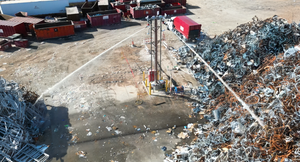New Technology Enables Paper Cup Recycling and Improves Food and Beverage Carton Recycling in Dallas
This cutting-edge technology will enable the MRF to start accepting and sorting paper cups, and more efficiently capture food and beverage cartons from residents.
May 25, 2023

FCC Environmental Services, a leading waste management provider in the Dallas-Fort Worth Metroplex, has installed new robotic sorting technology at its materials recovery facility (MRF). This cutting-edge technology will enable the MRF to start accepting and sorting paper cups, and more efficiently capture food and beverage cartons from residents throughout the greater Dallas area. This will ensure the valuable fiber found in both types of containers can go on to make new paper-based products.
FCC joins a growing trend of MRFs and communities that are including paper cups and food and beverage cartons as part of their residential recycling programs. This initiative was made possible by a collaborative equipment grant from the Carton Council of North America (CCNA), the Foodservice Packaging Institute (FPI), and the NextGen Consortium.
“With the installation of this new robotic sorting technology, we are proud to expand and improve our recycling capabilities and offer our customers in the Dallas metropolitan area the opportunity to recycle paper cups and cartons,” said Bruce Magnuson, FCC’s senior general manager.
“This robotic sorting and AI is a great example of how technology can help improve recycling and ultimately contribute to our circular economy by capturing more recyclable materials,” said Larine Urbina, vice president of communications for the Carton Council. “We are proud to work with FCC to embrace innovation to expand recycling. Collaboration with others throughout the recycling value chain is a cornerstone of the Carton Council’s strategy.”
MRFs have multiple options for managing paper cups and cartons. While many MRFs include cups and cartons in mixed paper bales, FCC has opted to sort this material to a higher-value poly-grade bale. The new AMP robot plays a crucial role in the mechanical recovery and makes the sorting of these materials for the higher-value market possible.
“Strengthening recycling infrastructure is vital to creating a more circular future for packaging. The NextGen Consortium is thrilled to partner with FCC and other industry leaders to provide grant funding for new recycling technology that can help keep more valuable packaging, like cups and cartons, in circulation and reduce waste,” said Kate Daly, Head of the Center for the Circular Economy at Closed Loop Partners––the managing partner of the NextGen Consortium.
“Our equipment grant program is designed to help organizations invest in new recycling infrastructure and drive innovation in waste management. We are excited to see the impact it is having in the Dallas metro area expanding recycling to nearly half a million households,” said Natha Dempsey, president of the Foodservice Packaging Institute.
Once paper cups and cartons enter the recycling system, they can be used by mills to make new paper products that consumers use every day, like paper towels, toilet paper, napkins, and even new cups. Follow FCC’s progress and other recycling efforts at https://fccenvironmental.com.
##
ABOUT FCC: FCC is a global industry leader since the 1900s. Today, FCC is one of the world’s largest waste management and recycling companies with a presence in over 35 countries. FCC’s more than 60,000 employees worldwide interact with citizens on a daily basis and focus on constantly increasing sustainability. Recycling lies at the center of FCC’s environmental services strategy with the company employing a wide variety of technological solutions to ensure the highest quantity and quality of material recovered.
ABOUT THE CARTON COUNCIL: The Carton Council is composed of four leading carton manufacturers, Elopak, Pactiv Evergreen, SIG and Tetra Pak. Formed in 2009, the Carton Council works to deliver long-term collaborative solutions in order to divert valuable cartons from the landfill. Through a united effort, the Carton Council is committed to building a sustainable infrastructure for carton recycling nationwide and works toward their continual goal of adding access to carton recycling throughout the U.S.
ABOUT THE NEXTGEN CONSORTIUM: The NextGen Consortium is a multi-year consortium that addresses single-use food packaging waste globally by advancing the design, commercialization, and recovery of food packaging alternatives. The NextGen Consortium is managed by Closed Loop Partners’ Center for the Circular Economy. Starbucks and McDonald’s are the founding partners of the Consortium. The Coca-Cola Company and PepsiCo are sector lead partners. JDE Peet’s, Wendy’s and Yum! Brands are supporting partners. The World Wildlife Fund (WWF) is the environmental advisory partner. Learn more at www.nextgenconsortium.com.
ABOUT FPI: Founded in 1933, the Foodservice Packaging Institute is the trade association for the foodservice packaging industry in North America. FPI promotes the value and benefits of foodservice packaging and plays an active role in advancing the recovery of FSP to support the circular economy. The association serves as the industry’s leading authority to educate and influence stakeholders. Members include raw material and machinery suppliers, manufacturers, distributors and purchasers of foodservice packaging. For more information, visit www.FPI.org.
You May Also Like


.png?width=300&auto=webp&quality=80&disable=upscale)